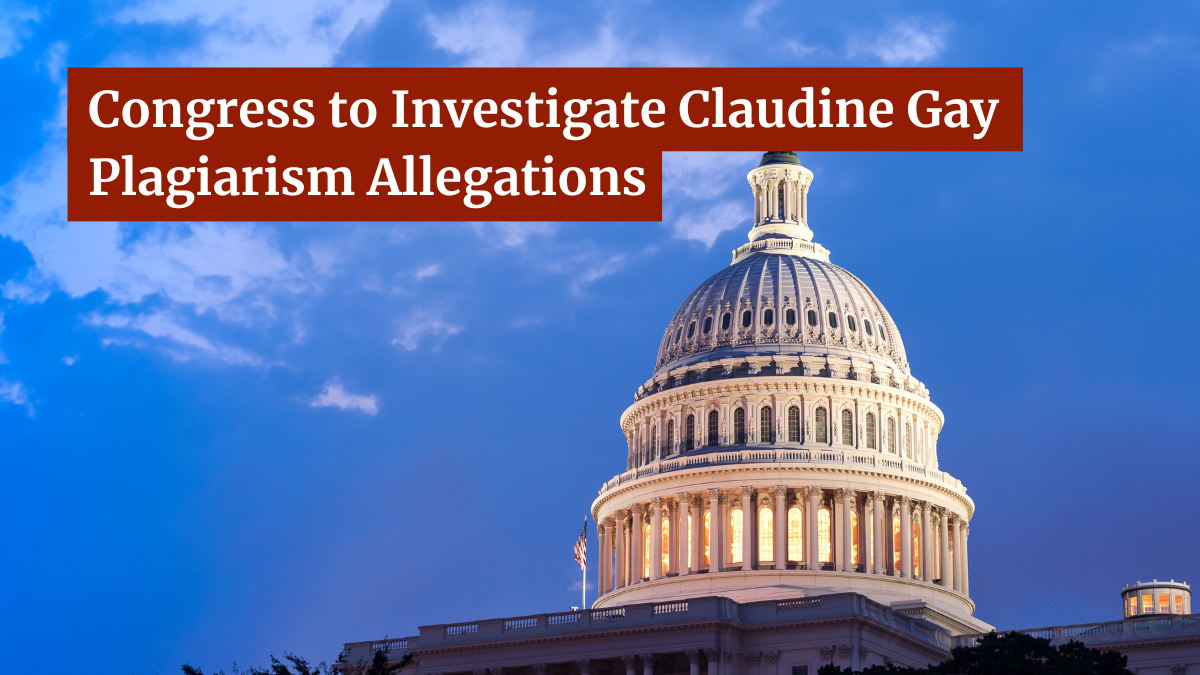Congress to Investigate Claudine Gay Plagiarism Allegations

Though the allegations have been known since at least late October, the story took on a new relevance when she, along with two other university presidents, testified before the House Committee on Education and the Workforce, which was investigating the issue of antisemitism in schools.
Gay and the others were seen as evasive, and this led many to call for her resignation. One of the other presidents, Liz Magill from the University of Pennsylvania, actually did resign follow the hearing.
Amidst that controversy, the plagiarism allegations were made public. However, at the time, Harvard made it clear that they had viewed the allegations and conducted an independent review. They concluded that, while there were “instances of inadequate citation” that they found no evidence Gay had violated their standards for research misconduct. As such, the school expressed their “unanimous support” for Gay.
Despite the support, Gay did request four corrections on two articles to address citation issues.
At the time, I felt that was largely an appropriate response. Though the allegations did highlight potentially serious issues, the passages involved were relatively short and what was needed, more than anything, was a thorough and transparent review of her work.
However, it appears unlikely that happened. That’s because as a new round of accusations have come to light, these involving Gay’s 1997 dissertation and a magazine article she wrote as a student before that. These have resulted in three more correction requests, all relating to her dissertation.
Harvard, for its part, is continuing to stand behind Gay, despite the latest allegations. But, while the school may still support Gay, members of The House Committee on Education have announced that they are expanding their investigation into Gay to include the plagiarism allegations.
In a letter sent to Harvard’s board, committee members said that they concerned that academic integrity standards are not being applied consistently, and worry that Harvard may be violating the public’s trust.
As such, the committee is asking for a list of any academic disciplinary actions taken against Harvard faculty or students since 2019.
It’s an escalation of a scandal that has already escalated well beyond what one would expect for any other researcher or university president.
That, in turn, is what has me most worried about this particular story. Not that the issues being discussed aren’t serious, but that the focus may be in the wrong place.
My Analysis of the New Allegations
The new allegations are very similar to the previous ones. It includes a lengthy list of alleged acts of plagiarism, however, as with last time, they vary wildly in length, evidence of actual copying and the similarity between the alleged plagiarism and the source material.
Once again, several of the highlighted examples do point to potentially serious issues. This is particularly true when looking at her dissertation and a magazine article she wrote as a student.
These passages included lengthier runs of text that cannot be trivially explained through coincidence and were not properly quoted and/or cited. However, many of the other passages included were short passages, passages with very little overlap and sentences that were similar but likely out of practical necessity more than plagiarism.
The list simultaneously points out concerning issues and, seemingly, tries to make the problem seem much larger than it is.
However, what’s most worrisome about this, to me, is that these allegations should have been detected by any investigation that Harvard did into Gay’s work. This is particularly true with the passages from her dissertation.
It’s clear that Harvard’s independent review of the allegations did not involve an investigation into her other works. Most likely, it was an examination of the allegations, not a full independent investigation.
Harvard knew about these allegations in October and had ample opportunity to get ahead of any new allegations. They chose not to. While a month and a half is a tight time frame for a full evaluation of someone’s academic career, it is possible to at least get initial findings.
Instead, Harvard seems content to allow the members of the public to perform the investigation and simply respond to allegations as they rise. This harms both the school and Gay by ensuring that this controversy continues to stretch out.
However, it seems like the controversy will be stretching out for quite some time. That’s because the Committee on Education and the Workforce has announced they are expanding their investigation to include these plagiarism allegations, and whether administrators are being held to the same standards as students.
But, while the issue is important, by focusing on Claudine Gay, the committee is likely missing the actual problem, which is much larger than Harvard, or even higher education.
The Actual Problem
To be clear, there is a serious issue here. Schools routinely hold their students to a higher and stricter standard when it comes to plagiarism than they handle their faculty and staff.
Students routinely face stern punishments, even for very minor infractions. Though very few cases of plagiarism result in expulsion or suspensions (especially for first time offenders), it’s not uncommon for students to be forced to redo an assignment, get a zero on the assignment or even fail the class.
Meanwhile, it’s common practice for researchers to get a chance to correct minor citation issues, such as what we are seeing with Gay. It’s only in extreme cases of plagiarism or research fraud that disciplinary action is taken, or a researcher is at risk of losing their job.
To give an easy example. In October 2021, W. Franklin Evans, who was then the president of West Liberty University, was caught repeated plagiarizing in speeches he was giving as President. Importantly, it wasn’t past research that was in dispute, it was the work he was doing as president.
However, though the board did vote unanimously to discipline him, they also voted against termination and did not clarify what discipline he was receiving.
He was eventually let go as president, but only after his contract expired two years later. It’s difficult to believe that a student at the school, if faced with a similar pattern of plagiarism in their coursework, would be given that same chance.
The issue also isn’t limited to higher education. In February 2020, Katy Independent School District superintendent Lance Hindt was accused of plagiarism in his dissertation. Though he eventually resigned, the district initially threw their full sport behind Hindt. This included a rally for Lindth that was attended by many of the teachers in the district.
Even after he left, he was given two years of salary and had $25,000 set aside for him if he wanted to file a defamation lawsuit.
Educational institutions of all types have a lengthy history of treating their employees more gently than they would treat students in similar situations. The problem is not unique to Harvard, not unique to higher education, and not unique to the United States.
It’s simply an unfortunate fact of life in education. While it’s something I would like to see changed, I don’t think this committee is in the best position to do so and, by focusing Harvard and Gay, I worry that they’re missing what the actual problem is.
Bottom Line
The new allegations don’t change the calculus for me significantly when it comes to Gay herself. While there are definitely new concerns, what we are ultimately talking about is half a dozen paragraphs in a 25+ year body of work. Worrisome and deserving of deeper investigation, but not by itself warranting an extreme reaction.
What has changed in my mind is Harvard itself. When the school said that they had investigated Gay’s work, it’s clear that they had not. Though even the best plagiarism analyses can miss things, the issues in her dissertation are precisely what I would have expected such a check to find.
What we need is a full, transparent evaluation of Gay’s work. As Harvard’s president, she should be held to the highest standards and the issue isn’t that her record has blemishes, it’s that we don’t know how serious or how numerous those blemishes actually are.
That said, the congressional investigation isn’t likely to help much. While I agree that there is a serious issue here that is worth evaluating, I don’t know if this committee is the correct place for this evaluation and, by focusing on Gay and Harvard, I doubt that they’re going to be examining the much larger, systemic problem.
In the end, this investigation is, like much of the Claudine Gay plagiarism scandal, motivated more by politics than interest in research and academic integrity. While the issues here are real and may be very significant, understanding them requires a degree of nuance and balance that is difficult in this climate.
I hope that, even if this isn’t the case to spark the needed conversations, that it shines enough of a light on the issues that others can pick up the dialog and move forward later.
Want to Reuse or Republish this Content?
If you want to feature this article in your site, classroom or elsewhere, just let us know! We usually grant permission within 24 hours.
